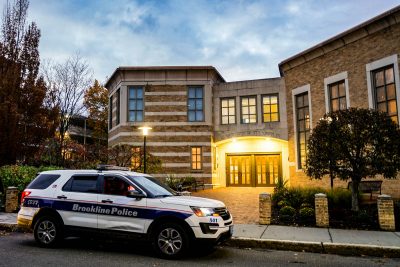During Saturday morning Shabbat services at the Chabad House of Greater Boston, Rabbi Shmuel Posner heard a ring at the door. He answered it and found a police officer. Since many observant Jews do not use electronics on Shabbat, the officer came to alert the congregation of the shooting that occurred at the Tree of Life Synagogue in Pittsburgh, Pennsylvania, that same day.

In light of the Pittsburgh synagogue shooting, Boston community and city organizations are considering possible measures to prevent further attacks.
The Boston Police Department sent an email statement in which they wrote that they have increased patrols in and around Boston synagogues to keep community members safe.
“While there are no credible threats targeting similar religious institutions in Boston,” the email stated, “BPD reminds community members to remain vigilant while the Boston Regional Intelligence Center continues to closely monitor the situation while sharing information with law enforcement agencies on both the federal, state and local levels.”
Callie Rabinovitz, of Brookline, attends Temple Israel of Boston and works with sixth grade students in their education sector. The 18-year-old high school senior said there are significant security measures in place at her synagogue.
“You have to be buzzed in to enter,” Rabinovitz said, “and there are security guards at the door.”
Although she grew up knowing that Jewish people are a minority in the United States and have faced a long history of oppression, Rabinovitz said the Pittsburg shooting still came as a shock to her and her local Jewish community.
“It’s definitely scary when you have been raised your whole life to think that you have sort of transcended the oppression,” Rabinovitz said, “and then there is an anti-Semitic shooting.”
Some Jewish Boston residents have said they have seen an increase in anti-Semitism in their hometowns, The Boston Herald reported. However, several Jewish people who live in the Greater Boston area said they have not seen an increase in this area since the attack, The Daily Free Press reported.
Paul Singer, 52, of Brighton, who works as the investigative editor for the New England Center for Investigative Reporting and WGBH News, said his mother was an active member of the Tree of Life Congregation. Singer said he and many of his Jewish friends in Pittsburgh think the focus should not be on increasing security around places of worship.
“The question is not, ‘Would a gun make your synagogue safer?’” Singer said. “The question is, ‘What do we need to do in America? What do we need to do in our communities to make everyone safer and to make this kind of violence less likely?’ That is where the focus needs to be, on building tolerance, building community, building bridges to other communities.”
Lori Lefkovitz, director of the Jewish Studies Program at Northeastern University, said high levels of security at places of worship are not the solution to preventing acts of anti-Semitism.
“I don’t think that more guns make us safer,” Lefkovitz said. “It is important that local police be alert to the importance of protecting houses of worship and religious institutions, and we all need to be vigilant about security, sadly. That said, I would not wish for us to put armed protection at the expense of our feeling safe and free.”
Posner, who primarily serves university students in Boston through the Chabad House, said anti-Semitic violence must not only be combated with increased security but pride within religious groups as well.
“It has only been 100 years since the Holocaust,” Posner said. “We haven’t forgotten. These are all things we think about. We don’t allow them to define us.”
Posner said it is imperative that the Jewish community does not allow itself to be weakened by the Pittsburgh shooting.
“We need to be careful, but the most important thing we need to do is portray a sense of confidence and security,” Posner said. “We are the United States. It is a country of democracy with freedom of speech and freedom of religion, and it is protected. We need to show the people that think they can harm us that they will never, ever be successful.”



















































































































